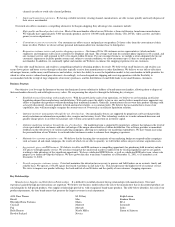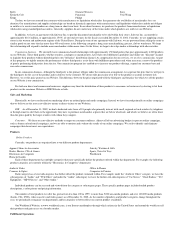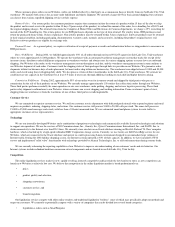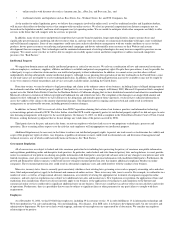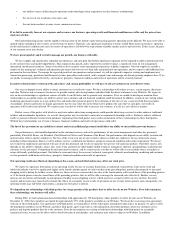Overstock.com 2002 Annual Report Download - page 16
Download and view the complete annual report
Please find page 16 of the 2002 Overstock.com annual report below. You can navigate through the pages in the report by either clicking on the pages listed below, or by using the keyword search tool below to find specific information within the annual report.
We may not be able to obtain trademark protection for our marks, which could impede our efforts to build brand identity.
We have filed trademark applications with Patent and Trademark Office seeking registration of certain service marks or trademarks. There can be no
assurance that our applications will be successful or that we will be able to secure significant protection for our service marks or trademarks. Our competitors
or others could adopt product or service marks similar to our marks, or try to prevent us from using our marks, thereby impeding our ability to build brand
identity and possibly leading to customer confusion. Any claim by another party against us or customer confusion related to our trademarks, or our failure to
obtain trademark registration, could negatively affect our business.
Risks Relating to the Internet Industry
Our success is tied to the continued use of the Internet and the adequacy of the Internet infrastructure.
Our future revenues and profits, if any, substantially depend upon the continued widespread use of the Internet as an effective medium of business and
communication. Factors which could reduce the widespread use of the Internet include:
actual or perceived lack of security of information or privacy protection;
possible disruptions, computer viruses or other damage to the Internet servers or to users' computers; and
excessive governmental regulation.
Customers may be unwilling to use the Internet to purchase goods.
Our long-term future depends heavily upon the general public's willingness to use the Internet as a means to purchase goods. The failure of the Internet to
develop into an effective commercial tool would seriously damage our future operations. E-commerce is a relatively new concept, and large numbers of
customers may not begin or continue to use the Internet to purchase goods. The demand for and acceptance of products sold over the Internet are highly
uncertain, and most e-commerce businesses have a short track record. If consumers are unwilling to use the Internet to conduct business, our business may not
develop profitably.
The security risks of e-commerce may discourage customers from purchasing goods from us.
In order for the e-commerce market to develop successfully, we and other market participants must be able to transmit confidential information securely
over public networks. Third parties may have the technology or know-how to breach the security of customer transaction data. Any breach could cause
customers to lose confidence in the security of our Websites and choose not to purchase from our Websites. If someone is able to circumvent our security
measures, he or she could destroy or steal valuable information or disrupt our operations. Concerns about the security and privacy of transactions over the
Internet could inhibit the growth of the Internet and e-commerce. Our security measures may not effectively prohibit others from obtaining improper access to
our information. Any security breach could expose us to risks of loss, litigation and liability and could seriously disrupt our operations.
Credit card fraud could adversely affect our business.
We do not carry insurance against the risk of credit card fraud, so the failure to adequately control fraudulent credit card transactions could reduce our
net revenues and our gross margin. We have implemented technology to help us detect the fraudulent use of credit card information. However, we may in the
future suffer losses as a result of orders placed with fraudulent credit card data even though the associated financial institution approved payment of the
orders. Under current credit card practices, we may be liable for fraudulent credit card transactions because we do not obtain a cardholder's signature. If we
are unable to detect or control credit card fraud, our liability for these transactions could harm our business, results of operation or financial condition.
If one or more states successfully assert that we should collect sales or other taxes on the sale of our merchandise or the merchandise of third parties
that we offer for sale on our Websites, our business could be harmed.
We do not currently collect sales or other similar taxes for physical shipments of goods into states other than Utah. One or more local, state or foreign
jurisdictions may seek to impose sales tax collection obligations on us and other out-of-state companies that engage in online commerce. Our business could
be adversely affected if one or more states or any foreign country successfully asserts that we should collect sales or other taxes on the sale of our
merchandise.
Existing or future government regulation could harm our business.
We are subject to the same federal, state and local laws as other companies conducting business on the Internet. Today there are relatively few laws
specifically directed towards conducting business on the Internet. However, due to the increasing popularity and use of the Internet, many laws and
regulations relating to the Internet are being debated at the state and federal levels. These laws and regulations could cover issues such as user privacy,
freedom of expression, pricing, fraud, quality of products and services, taxation, advertising, intellectual property rights and information security.
Applicability to the Internet of existing laws governing issues such as property ownership, copyrights and other intellectual property issues, taxation, libel,
obscenity and personal privacy could also harm our business. For example, United States and foreign laws regulate our ability to use customer information
and to develop, buy and sell mailing lists. The vast majority of these laws were adopted prior to the advent of the Internet, and do not contemplate or address
the unique issues raised thereby. Those laws that do reference the Internet, such as the Digital Millennium Copyright Act, are only beginning to be interpreted
by the courts and their applicability and reach are therefore uncertain. These current and future laws and regulations could harm our business, results of
operation and financial condition.
Laws or regulations relating to privacy and data protection may adversely affect the growth of our Internet business or our marketing efforts.
We are subject to increasing regulation at the federal, state and international levels relating to privacy and the use of personal user information. For
example, we are subject to various telemarketing laws that regulate the manner in which we may solicit future suppliers and customers. Such regulations,
•
•
•


